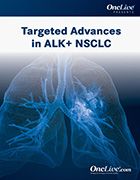Dr. Drilon on the Safety Profile of Brigatinib in ALK+ NSCLC
Alexander Drilon, MD, discusses the safety profile of brigatinib in ALK-positive non­–small cell lung cancer.
Alexander Drilon, MD, research director, Early Drug Development, Memorial Sloan Kettering Cancer Center, discusses the safety profile of brigatinib (Alunbrig) in ALK-positive non­—small cell lung cancer (NSCLC).
Brigatinib is associated with a risk of early pulmonary events. These events occur in about 3% of patients who receive brigatinib as first-line therapy, according to results of the phase III ALTA-1L trial.
This toxicity appears to be mitigated with a lead-in dose of 90 mg daily for a week before increasing the dose to 180 mg daily for the remainder of treatment. If an early pulmonary event does occur, it can be managed by reducing the 90 mg dose, says Drilon.
Other toxicities with brigatinib are also associated with other TKIs, such as gastrointestinal issues, changes in liver function tests, and transaminitis. Additionally, myositis may occur as indicated through increased creatine phosphokinase levels, concludes Drilon.




